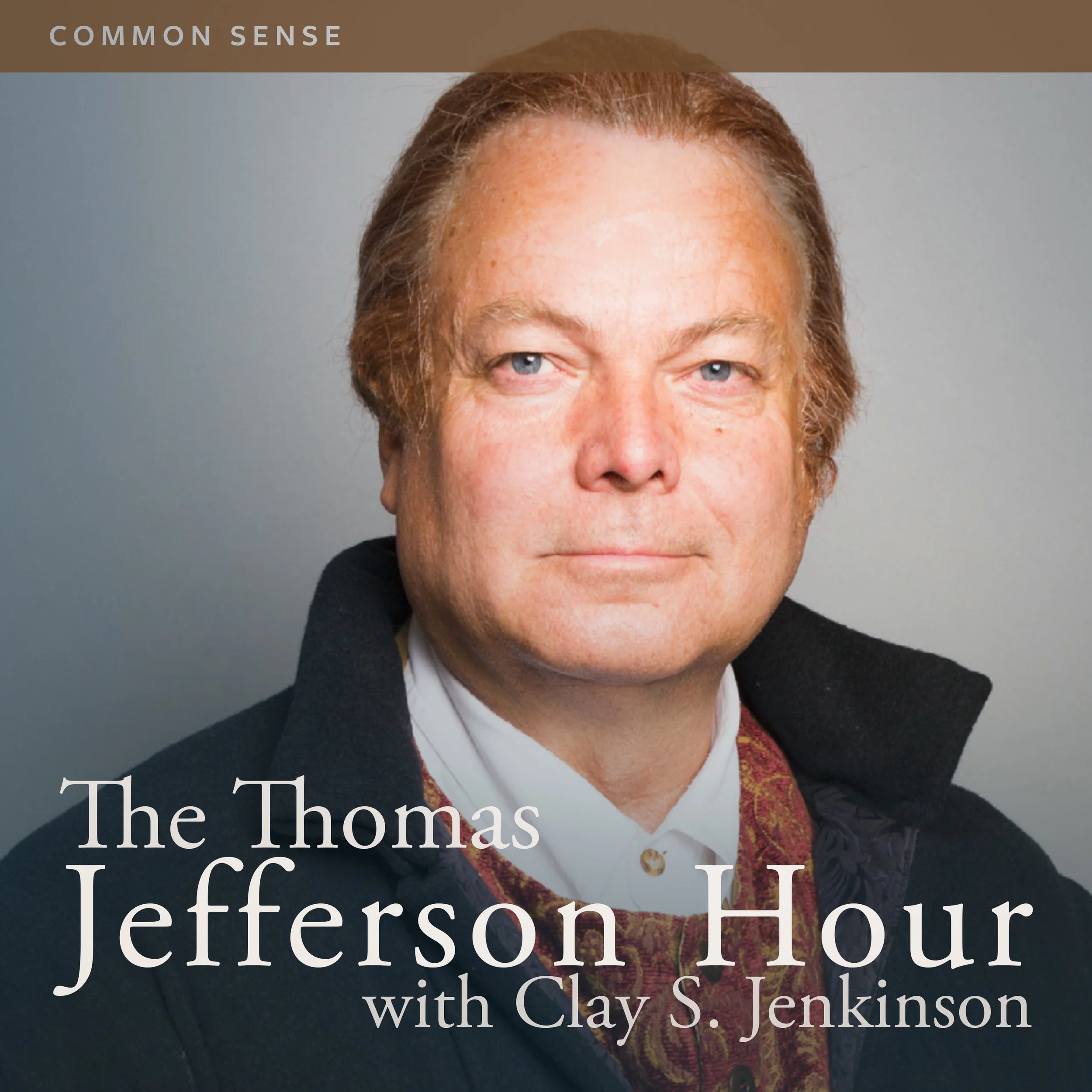Professor Joseph Ellis joins us this week for further discussion about his new book, The Cause: The American Revolution and Its Discontents. For more than two centuries, historians have debated the history of the American Revolution, disputing its roots, its provenance, and above all, its meaning. The Cause is the product of Ellis' lifetime of writing about America’s founding era. The book enlightens and challenges the story of the founding of our nation.
#1439 Mutual Strength and Advantage
This week we talk with President Jefferson about the British point of view of rebellion in America which eventually led to the Revolutionary War. The conversation begins and ends with Jefferson's thoughts on Benjamin Franklin, who had been an anglophile hoping for peace between the two nations, but ended up as a leading voice for American independence.
#1398 The Indispensable Man
This week in an interesting debate match, Clay Jenkinson and Joseph Ellis argue over who is the “Indispensable Man” of the American Revolution. Ellis argues for George Washington, while Jenkinson says it has to be Jefferson. A very wise listener suggests that they are both wrong: it’s Benjamin Franklin.
#1331 Young Washington with Peter Stark
"The French ... thought it was an assassination, a war crime, that Washington was a murderer."
— Peter Stark
We speak with Peter Stark, author of Young Washington: How Wilderness and War Forged America’s Founding Father.
We discuss George Washington’s formative years and character traits, his travels into the Ohio country, and his relationship with lieutenant governor Robert Dinwiddie. We talk about how Washington’s involvement in the Battle of Jumonville Glen touched off the French and Indian War.
#1330 Wilderness and War
"This book reveals [Washington] as a man of emotion, raw emotion."
— Clay S. Jenkinson
In anticipation of our conversation next week with Peter Stark, the author of Young Washington, we speak with Jefferson about our first president. Jefferson also comments on the time change, and the importance of using available daylight.
#1310 Valley Forge with Bob Drury and Tom Clavin
#1298 As Requested
"You have to wait 14 years under the naturalization law before you can become a full citizen of the United States. These were palpable violations of the Bill of Rights."
— Clay S. Jenkinson portraying Thomas Jefferson
We spend this week, as requested, responding to submitted questions and correcting some factual errors pointed out by our listeners.
#1293 4th of July
The Declaration of Independence
#1292 Common Sense
"Paine refused to take proceeds from this book."
— Clay S. Jenkinson
This week, we present another of our Jefferson Hour Book Club episodes and discuss Thomas Paine’s Common Sense.
#1291 Circumstances
"The debate in American history is not between Hamilton and Jefferson, the debate is between Adams and Jefferson."
— Clay S. Jenkinson
This week, we answer listener questions on the Thomas Jefferson Hour, including a letter from a writer who wonders whether the Founding Fathers were geniuses who seized the moment, or simply average people living in extraordinary times. We also speak with our good friend Beau Wright.
#1276 Revolutionary Summer
"I feel an Awe upon my Mind, which is not easily described."
— John Adams
Clay and David discuss the book Revolutionary Summer: The Birth of American Independence, referred to as "a distinctive portrait of the crescendo moment in American history from the Pulitzer-winning American historian, Joseph Ellis." The book chronicles the events of the summer of 1776 as America’s war for independence began, and how America was nearly defeated by the British.
#1275 Joseph Ellis
"There's a perfect alignment between Jefferson's own contradictions and the rest of American history."
— Joseph J. Ellis
Clay speaks with Dr. Joseph J. Ellis, author of more than ten books, including American Sphinx, Passionate Sage, and Revolutionary Summer. His forthcoming book is American Dialogue: The Founders and Us.
#1268 Peaceful Transition
#1258 Dissent Is Essential
"Anything that is non-violent is an acceptable form of protest in a Republic."
— Thomas Jefferson, as portrayed by Clay S. Jenkinson
President Jefferson shares his view on what he calls an essential need for citizens to speak out about issues they disagree with and he explains why dissent is necessary for the health of American democracy.
Respect for the Flag
#1256 Last Refuge
#1232 Listener Questions
This week, we discuss listener questions about architecture, Sally Hemings, revolutionary war, Jefferson as a scientist, recommended books and how Clay's life has been affected by performing as Thomas Jefferson.
"What I discovered was that Jefferson embodies — in many respects, not in all of them — the world that I want to live in. I want to live in Thomas Jefferson's America." — Clay
























